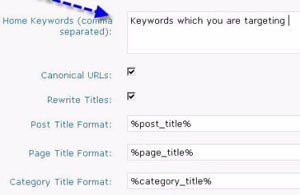One of the biggest advantages of WordPress over blogspot is the power to add functions and modify the settings for better search engine optimization. Search engine optimization in simple words means making your blog/website search engine friendly. This will help your posts to rank high in search engine.
WordPress is already SEO optimized but there are few settings needed to be done before launching your first post. If your useful post cannot be discovered by search engines, you are actually losing lots of potential readers.
1. Permalinks Migration
WordPress Permalinks are permanent links of your posts. By default wordpress permalinks are in the following format of a numbers with Post ID
This is not a search engine friendly permalink. First thing after installing wordpress, you should consider changing your permalink structure. If you use permalinks which has keywords in it and are relevant to your post, chances of ranking in search engines are high.
The ideal permalinks are
/%category%/%postname%/
/%postname%.html
You can use either of them, but if you use more than one categories for a single post, I would suggest you to go for later one. You can change your permalink structure, under your wordpress admin dashboard > Settings > Permalinks
But what if you are changing your permalinks after publishing many posts? Use the Permalinks migration-plugin, and it will help your old permalinks to redirect to new ones instantly. The redirection will be 301 permanent redirects, so you do not loose any Google link juice. Also see Advanced Permalinks Plugin.
2. SEO Friendly Images
Optimize your images for Search Engines. Many bloggers avoid the importance of traffic from image search engines, like Google image search and Yahoo image search. By adding an alt tag to your images you can make it search engine friendly.
The basic rule is if you upload any image by the name 12387.jpeg with the same alt tag, it doesn’t make any sense to search engines. But if you upload an image with the title iphone-screenshot.jpg and using the same alt tag, you can rank high in the image search engine results as well.
Though manually adding alt tag is not easy for every image you upload, this can be easily accomplished by using wordpress SEO-friendly image plugin.

It automatically updates all images with proper ALT and TITLE attributes. If your images do not have ALT and TITLE already set, SEO Friendly Images will add them according the options you set. Download SEO Friendly Images Plugin .
3. ALL in one SEO plugin
Recently I attended Wordcamp and got the opportunity to meet Matt Mullenweg. In the discussion round, one of the topics was integration of “ALL in one SEO plugin” with wordpress. Matt answered they would like it to be users choice rather then implementing it by default. The point here is “All in one SEO plugin” is one of the basic essential SEO plugin for any wordpress blogger.

All in one SEO plugin helps you to stuff appropriate keywords and optimizes your blog for the keywords you are targeting. You can read more about the plugin or download All-in-one SEO plugin
4. Broken Link Checker
Broken links become dead ends for search engine bots. Suppose you have written a post which is pointing to a website www.domain.com, and after some time website goes down; you will never realize it and such posts become dead ends for your blog.

Broken link checker wordpress plugin comes very handy in such situations. It will show the broken link on your dashboard which you can unlink from there. Download Broken link checker for WordPress
5. NoFollow Plugin
Nofollow plugin helps you to add a nofollow attribute to your external links. You can simply select to which external links you want to share your link juice. It’s always a good advice to add a nofollow attribute to bad neighborhoods, like warez websites or adult/p0rn websites. Download Nofollow WordPress Plugin
These search engine optimization tips will help you to get more visitors from search engines, but in the end it’s “Quality of the post” which matters the most. Don’t forget to share your search engine optimization technique.
Guest author Harsh Agarwal is a blogger from New Delhi, India who writes on ShoutMeLoud.com about social media, internet, computer tips and tricks, torrents and social networking. You can follow him on Twitter at @denharsh. You can also share your tips by guest blogging on QOT.
